Audi Q6 e-tron VS BMW X5
In the competitive landscape of electric SUVs, the Audi Q6 e-tron emerges as a formidable contender against the established BMW X5. While the Q6 e-tron boasts cutting-edge electric performance and a sleek, modern design, the X5 continues to impress with its powerful engine options and luxurious interior. Ultimately, the choice between these two vehicles hinges on whether drivers prioritize sustainability and innovation or prefer a traditional luxury SUV experience.
Audi Q6 e-tron
The Audi Q6 e-tron represents a significant step forward in the realm of electric vehicles, offering a perfect blend of cutting-edge technology and timeless design. With its spacious interior and advanced infotainment system, it provides both comfort and connectivity for the modern driver. The Q6 e-tron embodies Audi's commitment to sustainability without compromising on performance or luxury.
detailsBMW X5
The BMW X5 embodies a perfect blend of luxury and performance, offering a driving experience that is both dynamic and comfortable. Its elegant design is complemented by a spacious, high-quality interior that prioritises driver and passenger comfort. Advanced technology features ensure that the X5 meets the demands of modern drivers, providing both entertainment and safety on the road.
detailsIntroducing the Rivals: Audi Q6 e-tron vs BMW X5
In the ever-evolving realm of SUVs, two models stand out: the Audi Q6 e-tron, a fully electric offering from the German automaker, and the BMW X5, notable for its hybrid powertrains. As we delve into a detailed comparison of these two vehicles, we’ll explore their technical specifications, performance capabilities, and innovative features that aim to captivate buyers in the premium SUV market.
Powertrain and Performance
The Audi Q6 e-tron represents a significant step forward in electric mobility. It is available with a robust range of electric powertrains, boasting outputs of 292 to 516 HP and an impressive torque range up to 855 Nm. It can accelerate from 0 to 100 km/h in as little as 4.3 seconds, showcasing its sporty prowess. With a maximum speed of up to 230 km/h, the Q6 e-tron offers both performance and efficiency with electricity consumption as low as 15.6 kWh/100 km. Its electric range peaks at an astonishing 656 km, proving to be one of the champions in long-distance EV travel.
On the other hand, the BMW X5 offers a variety of powertrain options including diesel, petrol, and plug-in hybrid variants. Its power outputs range from 298 HP to a staggering 625 HP in the higher-performance trims. The X5 also has great acceleration figures, with some models reaching 100 km/h in just 3.9 seconds. However, with fuel consumptions as high as 12.9 L/100 km (for the hybrid models), it may not be as cost-effective for long journeys. Furthermore, the X5 has a slightly lower maximum speed of up to 250 km/h.
Battery and Fuel Efficiency
The Q6 e-tron shines in terms of its electric battery capacity, offering options up to 94.9 kWh. In contrast, the BMW X5’s maximum battery capacity for its plug-in hybrid version is only 25.7 kWh, allowing for a somewhat limited electric-only range of 97 km. While the Q6 e-tron features CO2 emissions rated at Class A (0 g/km), the X5 falls under Class G with emissions reaching up to 291 g/km in some versions, which certainly puts the Q6 e-tron ahead in eco-friendliness.
Dimensions and Interior Space
Size and comfort are vital aspects of any SUV, and here the BMW X5 has an upper hand in terms of width and trunk capacity. The X5 measures between 4935mm and 4948mm in length and 2004mm to 2015mm in width, providing a trunk capacity of up to 650 liters. The Q6 e-tron, although slightly shorter at 4771mm and narrower at 1939mm to 1965mm, still offers a respectable trunk space ranging from 499 to 526 liters.
Both SUVs accommodate five passengers comfortably, but the interior design philosophies are distinctly different. Audi is celebrated for its luxurious, minimalist cockpit dominated by technology, offering features like the MMI infotainment system and an impressive virtual cockpit. Meanwhile, the BMW X5 boasts a sporty design with a driver-focused cockpit and advanced iDrive system, ensuring a premium experience for both driver and passengers.
Innovative Features and Technology
Technologically, the Q6 e-tron includes cutting-edge features like the latest in driver assistance systems, adaptive cruise control, lane-keeping assist, and more. Its battery management system and fast charging capabilities allow for quick and easy recharging, reflective of Audi's commitment to electric mobility innovation.
Conversely, the BMW X5 also excels in technological offerings, with a suite of driver assistance features including adaptive cruise control, lane departure warning, and a robust infotainment system that supports Apple CarPlay and Android Auto. The X5 stands out with its optional Gesture Control, allowing drivers to control certain infotainment functions with hand movements.
Conclusion: Which SUV Reigns Supreme?
In the face-off between the Audi Q6 e-tron and the BMW X5, both models cater to different audiences. The Q6 e-tron is ideal for drivers seeking an electric vehicle that excels in efficiency and advanced technology, while the BMW X5 appeals to those desiring a traditional luxury SUV with versatile powertrain options. Ultimately, the choice between these two leading SUVs will depend on the buyer's priorities—whether they lean towards the electric future embodied by Audi or the established luxury and performance pedigree of BMW.
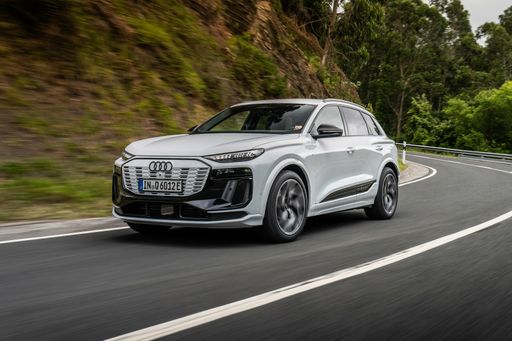 @ audi-mediacenter.com
@ audi-mediacenter.com
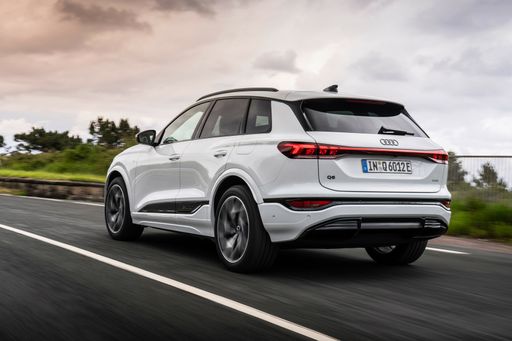 @ audi-mediacenter.com
@ audi-mediacenter.com
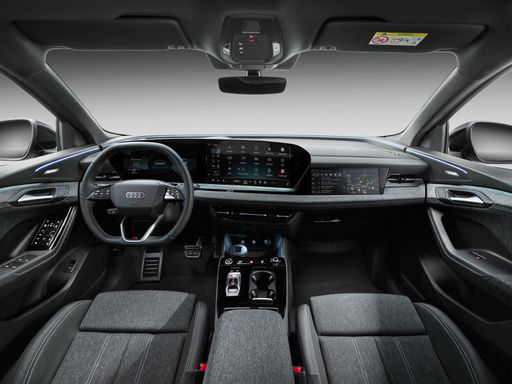 @ audi-mediacenter.com
@ audi-mediacenter.com
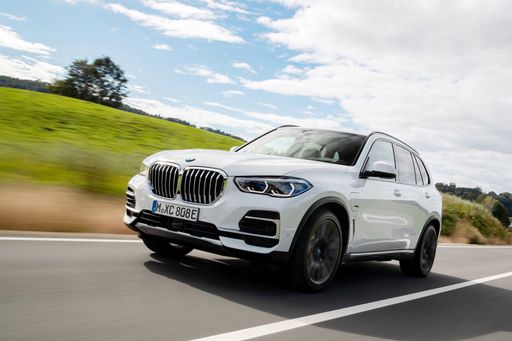 @ press.bmwgroup.com
@ press.bmwgroup.com
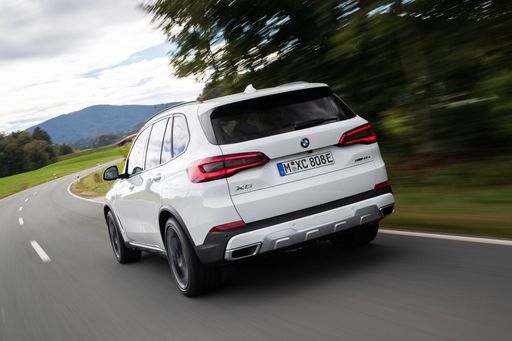 @ press.bmwgroup.com
@ press.bmwgroup.com
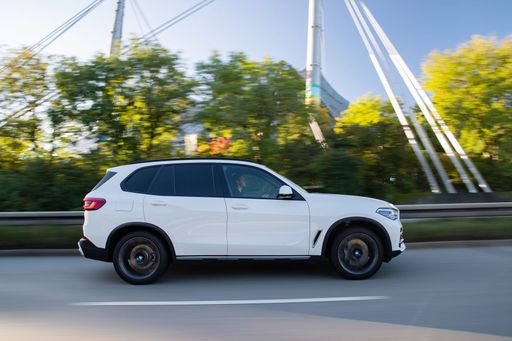 @ press.bmwgroup.com
@ press.bmwgroup.com
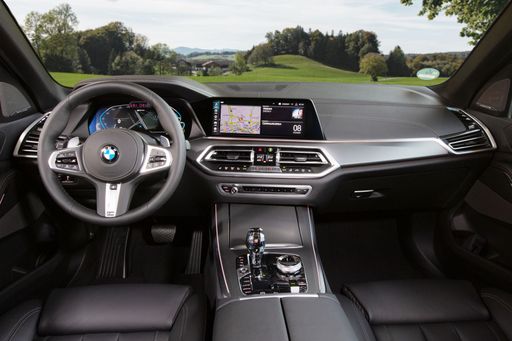 @ press.bmwgroup.com
@ press.bmwgroup.com
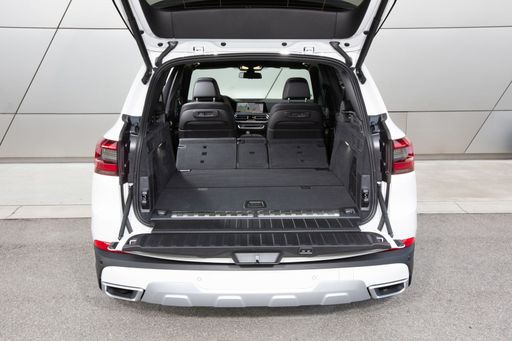 @ press.bmwgroup.com
@ press.bmwgroup.com

|

|
|
|
|
Costs and Consumption |
|
|---|---|
|
Price
about 58700 - 99100
$
|
Price
about 83100 - 154100
$
|
|
Consumption L/100km
-
|
Consumption L/100km
0.9 - 12.9
L
|
|
Consumption kWh/100km
15.6 - 18.9
kWh
|
Consumption kWh/100km
-
|
|
Electric Range
482 - 656
km
|
Electric Range
97
km
|
|
Battery Capacity
75.8 - 94.9
kWh
|
Battery Capacity
25.7
kWh
|
|
co2
0
g/km
|
co2
21 - 291
g/km
|
|
Fuel tank capacity
-
|
Fuel tank capacity
69 - 83
L
|
Dimensions and Body |
|
|
Body Type
SUV
|
Body Type
SUV
|
|
Seats
5
|
Seats
5
|
|
Doors
5
|
Doors
5
|
|
Curb weight
2200 - 2425
kg
|
Curb weight
2240 - 2495
kg
|
|
Trunk capacity
499 - 526
L
|
Trunk capacity
500 - 650
L
|
|
Length
4771
mm
|
Length
4935 - 4948
mm
|
|
Width
1939 - 1965
mm
|
Width
2004 - 2015
mm
|
|
Height
1665 - 1685
mm
|
Height
1755 - 1765
mm
|
|
Payload
540
kg
|
Payload
565 - 705
kg
|
Engine and Performance |
|
|
Engine Type
Electric
|
Engine Type
Diesel MHEV, Petrol MHEV, Plugin Hybrid
|
|
Transmission
Automatic
|
Transmission
Automatic
|
|
Transmission Detail
Reduction Gearbox
|
Transmission Detail
Automatic Gearbox
|
|
Drive Type
Rear-Wheel Drive, All-Wheel Drive
|
Drive Type
All-Wheel Drive
|
|
Power HP
292 - 516
HP
|
Power HP
298 - 625
HP
|
|
Acceleration 0-100km/h
4.3 - 7
s
|
Acceleration 0-100km/h
3.9 - 6.1
s
|
|
Max Speed
210 - 230
km/h
|
Max Speed
233 - 250
km/h
|
|
Torque
450 - 855
Nm
|
Torque
540 - 750
Nm
|
|
Number of Cylinders
-
|
Number of Cylinders
6 - 8
|
|
Power kW
215 - 380
kW
|
Power kW
219 - 460
kW
|
|
Engine capacity
-
|
Engine capacity
2993 - 4395
cm3
|
|
Top speed
210 - 230
km/h
|
Top speed
233 - 250
km/h
|
General |
|
|
Model Year
2024 - 2025
|
Model Year
2023 - 2024
|
|
CO2 Efficiency Class
A
|
CO2 Efficiency Class
G, B
|
|
Brand
Audi
|
Brand
BMW
|
Audi Q6 e-tron
Introducing the Audi Q6 e-tron: A Step into the Future of Electrification
The Audi Q6 e-tron marks a significant stride forward in the electric vehicle sector, cementing Audi's commitment to innovation and sustainability. This state-of-the-art SUV combines luxury, performance, and cutting-edge technology, catering to the eco-conscious driver without compromising on power or style.
Design Meets Functionality
The Audi Q6 e-tron showcases a sleek design aesthetic common in the Audi lineage. With a length of 4771 mm, it strikes an imposing presence on the road, combining practicality with sophisticated styling. It features a spacious interior that comfortably seats five and offers a generous boot capacity of 514 to 526 litres, making it perfect for both everyday commutes and longer journeys.
Advanced Powertrain Options
The Audi Q6 e-tron comes with a variety of powertrain configurations, reflecting the brand's push towards greater innovation in electric mobility. With a power range between 292 to 516 PS and a torque spread of 450 to 855 Nm, the vehicle promises an engaging driving experience. The electric drivetrain offers two modes of propulsion: rear-wheel drive for more traditional handling and all-wheel drive for enhanced traction under diverse driving conditions.
Efficiency Meets Performance
In terms of efficiency, the Audi Q6 e-tron competes strongly, leveraging advanced battery technology to deliver a range between 482 and 637 kilometres on a single charge, depending on the model. Consumption averages between 16.2 to 18.9 kWh per 100 km, showcasing Audi's commitment to minimal environmental impact. The model's CO2 efficiency class stands at A, highlighting its eco-friendly credentials.
Innovative Technology and Features
The Q6 e-tron is equipped with a host of innovative technologies that enhance both comfort and ultimate control. The vehicle is characterised by Audi’s virtual cockpit, offering intuitive infotainment controls along with a premium sound system. Safety and driver assistance systems are state-of-the-art, incorporating adaptive cruise control, lane assist, and park assist, ensuring peace of mind on every journey.
Acceleration and Speed
A performance enthusiast's dream, the Q6 e-tron accelerates from 0 to 100 km/h in an impressive 4.3 to 7 seconds, contingent on model specification. It boasts a top speed of 210 to 230 km/h, providing the thrilling dynamics typical of Audi's high-performance vehicles.
Electric Vehicle Infrastructure
With varying battery capacities from 75.8 to 94.9 kWh, the Q6 e-tron supports fast charging, making long-distance journeys more feasible than ever before. The advanced energy recuperation system further enhances battery efficiency, maximising range and reducing charging downtime.
A Cost-Effective Investment
The Audi Q6 e-tron presents not just a vehicle but a viable economic investment over the long haul. With a cost structure that spans €63,500 to €104,800, along with monthly running costs ranging from €1,426 to €2,038, it balances premium quality with a sustainable economic footprint.
Conclusion: A New Era of Driving
The Audi Q6 e-tron represents a new chapter in the evolution of electric SUVs, marrying performance with sustainability. As the industry moves toward a greener future, Audi drives forward with innovative design and groundbreaking technology, ensuring that the Q6 e-tron is not just a vehicle but a visionary statement for the future.
BMW X5
The BMW X5: Setting the Benchmark for Performance and Luxury
As one of the pioneers in the luxury SUV segment, the BMW X5 continues to set new standards with its blend of performance, comfort, and cutting-edge technology. The latest iterations offer a range of powerful engines, advanced hybrid systems, and a suite of innovative features that cement its status as a premium choice for discerning drivers.
Engine Power and Hybrid Innovations
The BMW X5 is available with a choice of robust powertrains, including diesel, petrol, and plug-in hybrid options. The range-topping models showcase impressive power outputs, with the potent X5 M Competition boasting 625 PS. Meanwhile, the plug-in hybrid models, such as the xDrive50e, demonstrate BMW's commitment to sustainability by offering remarkable efficiency with an electric-only range of up to 97 km and a CO2 efficiency class of as low as 21 g/km.
Technological Advancements
The 2023-2024 BMW X5 integrates state-of-the-art technology to enhance the driving experience. The latest versions come equipped with a Steptronic Sport automatic transmission system, ensuring seamless gear shifts and optimal performance. The xDrive all-wheel-drive system guarantees superior traction and control, regardless of the driving conditions, making it perfect for both urban environments and off-road adventures.
Design and Dimensions
With sleek exterior dimensions, the BMW X5 exudes an aura of elegance and power. Measuring up to 4948 mm in length, 2004 mm in width, and up to 1765 mm in height, it presents a commanding road presence. Inside, the SUV offers ample space with a boot capacity ranging from 500 to 650 litres, ensuring that you have all the room needed for both everyday items and larger cargo.
Comfort and Interior Features
The X5's interior is a masterclass in luxury and functionality, designed to offer maximum comfort for all occupants. With seating for five, the cabin is crafted with the finest materials and hosts a range of technological features, including an advanced infotainment system and intuitive cockpit controls. The M Sportpaket configurations further enhance the vehicle's sporty pedigree with premium equipment and design details.
Performance and Handling
The BMW X5 demonstrates impressive dynamics, with acceleration from 0-100 km/h achievable in just 3.9 to 6.1 seconds, depending on the model. Its powerful engines and sport-tuned suspension provide exceptional agility and stability, making the X5 not only a comfortable cruiser but also a thrilling performer on twisty roads.
Economical Considerations
Despite its premium offerings, the BMW X5 is designed with efficiency in mind. Fuel consumption figures for the X5 range from 0.9 to 12.9 L/100 km across different powertrains, providing options for varying needs and driving styles. The monthly costs to run a BMW X5 range from €2070 to €3383, underlining its position as a luxury SUV option with significant value.
Conclusion
The BMW X5 remains a formidable contender in the luxury SUV market, thanks to its amalgamation of power, efficiency, and advanced technology. With a host of choices in terms of engine types and trim levels, there's an X5 to suit the preferences of any driver looking for excellence without compromise. It's not just a vehicle; it's a statement of refined performance.
